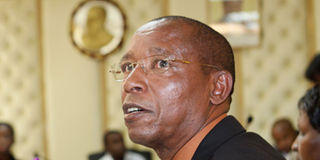Teachers criticise Education minister Kilonzo tuition directive

Education minister Mutula Kilonzo during a news conference at his Jogoo House office in Nairobi, August 15, 2012. He said holiday tuition stands banned as teachers criticised the directive.
What you need to know:
- Teachers union laments ban will see tuition resurface at homes as a commercial venture.
- Minister says he has written to the Teachers Service Commission (TSC) asking the agency to enforce the ban.
Teachers have criticised Education minister Mutula Kilonzo's move to ban holiday tuition “without consultation”.
The Kenya National Union of Teachers (Knut) said Wednesday that Mr Kilonzo failed to question why the practice continued unabated in schools throughout the country.
"When you ban tuition in schools it will resurface in the private centres at homes and towns which is more dangerous since it will be purely commercial," Knut chairman Wilson Sossion said.
"When the minister takes it upon himself to ban the holiday tuition, he fails to deal with the root issues of why it takes place and address them."
But two parents associations took sides with Mr Kilonzo saying that holiday tuition largely remained a commercial venture by the teachers and the concerned schools.
"The amount that teachers are charging for the tuition is weighing down on the parents,” Mr Nathan Baraza of the Parents and Teachers Association said.
He noted that extra lessons (remedial teaching) should only be conducted for the 'weak’ learners.
Child rights abuse
However, Musau Ndunda of the National Association of Parents, said the teachers were making as much as Sh800 million when each of the pupils paid Sh3,000 on average for a period of two weeks.
This figure he said resulted as a research his association conducted last year on how much parents paid during the holidays for the extra lessons.
Speaking at his offices in Jogoo House, Mr Kilonzo said “the tuition schools provide during holidays is a gross abuse of the rights of children, under the Constitution, and relevant international conventions of the child.”
"Professionally, extra coaching or tuition is given to learners who show weakness in certain subjects. Such learners need remedial teaching to compensate the lapses they suffer from in terms of learning ability, compared with their classmates.”
“This is what constitutes remedial teaching and does not involve payment by parents. This is part and parcel of the calling of a teacher.
"It is in fact a violation of the teachers’ code of ethics to either provide extra tuition to such learners at a fee and/or, decline to provide it when payment is not forthcoming," said the minister.
Enforce ban
According to the envisaged Education Act, no public school shall charge or cause any parent, guardian or any other person acting in the place of a parent to pay any tuition fees for or on behalf of any pupil in the school.
Mr Kilonzo said that he had already written to the Teachers Service Commission (TSC) asking the agency to enforce the ban and take disciplinary action to those who violate it.
“Any principal or teacher entertaining contrary practice is violating national government policy on education and violating the Constitution,” said the letter addressed to TSC secretary Gabriel Lengoiboni.
Holiday tuition has been a perennial issue in the education sector.
In 2008, the then Education PS Karega Mutahi sent out a circular to schools banning extra tuition during break time, lunch, after school, weekends and during holidays.
This circular was aimed at strengthening the provisions of the TSC Code of Conduct and Ethics, which prohibits a teacher from charging or accepting any fee for tuition from a student even if the tuition is given outside official working hours.
“The policy on extra tuition as enunciated by the Ministry then still stands. Nothing has changed to allow such practice in any school—public or private,” Mr Kilonzo said.
The minister told journalists that the Kenya Institute of Education had developed a syllabus that was expected to be covered in 39 weeks during the year.
He added that therefore learners should be accorded an opportunity to relax, and learn important social skills through interactions among themselves and with adults during holidays.
This is very important in coping with the world of work and the complexities of modern life when they come of age.
“Providing remedial teaching to an entire class contradicts the principle that underlies remedial teaching. Whole class teaching should be left to normal curriculum delivery process during school calendar. This is the policy,” he said.




